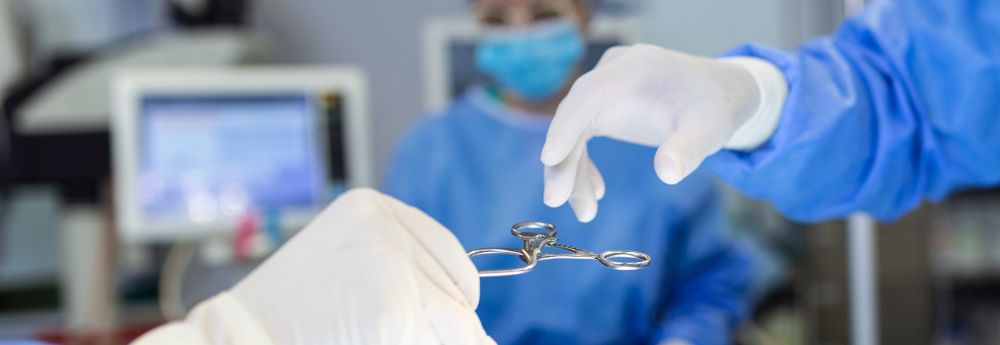At Dorsey College, the hybrid associate of applied science in surgical technology program is designed to prepare individuals to become a surgical technologist, an integral member of the patient care team in the operating room who supports and assists surgeons and nurses, while also providing patient care contributing to the patient’s physical and psychological well‐being.
The curriculum in the associate of applied science in surgical technology program is comprised of both general education courses for a solid educational foundation, and specialized courses in surgical technology and surgical procedures with concentrated study in the basic sciences and mathematics. Emphasis is placed on effective communication, safety, and contributing to quality patient care. At Dorsey College, surgical technologist students will have the opportunity to learn in a hands-on environment, while being exposed to the knowledge needed to pursue your surgical technology degree.
The Dorsey College surgical technologist associate degree program has been designed to be completed in under two years. Upon successful completion of the program, provided all requirements for graduation are met, the graduate will receive an Associate of Applied Science in Surgical Technology, and may be eligible to sit for a certification examination to pursue becoming a certified surgical technologist. Surgical technologists may find positions in hospitals, surgical centers, and other healthcare facilities that may perform surgical related procedures.
Minimum Expectations Statement
To prepare entry-level Surgical Technologists who are competent in the cognitive (knowledge), psychomotor (skills), and affective (behavior) learning domains to enter the profession.
Accreditation
The associate of applied science in surgical technology program at Dorsey College is accredited by the Commission on Accreditation of Allied Health Education Programs (CAAHEP) upon the recommendation of the Accreditation Review Council on Education in Surgical Technology and Surgical Assisting (ARC/STSA). Contact information for ARC/STSA is as follows: Accreditation Review Council on Education in Surgical Technology and Surgical Assisting , 19751 E. Mainstreet, Suite 339, Parker, CO 80138, (303) 694-9262, www.arcstsa.org. Contact information for CAAHEP is as follows: Commission on Accreditation of Allied Health Education Programs, 9355 – 113th St. N, #7709, Seminole, FL 33775, (727) 210-2350, www.caahep.org.
Are you ready to begin your surgical technologist training? Contact Dorsey College today to learn how you can begin your training and earn your Associate of Applied Science in Surgical Technology.
Looking for “surgical technologist programs in Michigan?”
If you are looking for “surgical technologist programs in Michigan,” Dorsey College can help you in your journey. The Associate of Applied Science in Surgical Technology program is offered at the following Dorsey College campus location:
Dorsey College’s Surgical Technologist degree program
Dorsey College’s Surgical Technologist Degree Program Goals
The goal of the Associate of Applied Science in Surgical Technology program is to graduate entry-level surgical technologists who excel across all domains of professional practice. Specifically, students will develop a comprehensive understanding of surgical principles, procedures, instrumentation, and patient safety guidelines (cognitive), refine their technical abilities to consistently maintain a sterile field, handle and pass instruments accurately, and effectively support the surgical team during procedures (psychomotor), and exemplify professional behavior through respectful communication, ethical decision-making, cultural sensitivity, and compassionate patient-centered care (affective). Through a curriculum that integrates classroom instruction, hands-on lab practice, and supervised clinical experiences, the program prepares surgical technology students to meet program minimum expectations and the expectations of Dorsey College’s communities of interest.
The surgical tech program at Dorsey College consists of general courses that will help set a solid foundation for your education. Specialized courses are also included in the surgical technologist degree program, designed to prepare you for future success on the job.
At Dorsey College, this surgical technologist degree program has been designed to be completed in just two years. That means you can train in a relatively short amount of time in order to pursue your new career as a surg tech.
General Education Courses
General education courses in the surgical technologist degree program include:
- Anatomy and Physiology with Advanced Medical Terminology
- English Composition
- Mathematical Concepts
- Introduction to Psychology
- Introduction to Ethical Principles
- Pathology for Health Professions
- Medical Microbiology
The specialized courses in the surgical tech program are designed specifically to introduce you to surgical technology with an emphasis on safety and patient care. Topics include instrumentation, pharmacology for the surgical technologist, surgical procedures coupled with clinical training, and a capstone course.
Specialized Courses
Specialized courses in the surgical technologist degree program include:
- The Surgical Patient
- Introduction to Surgical Technology
- Surgical Instrumentation
- Surgical Technology I
- Pharmacology for the Surgical Technologist
- Surgical Procedures I and II
- Surgical Practicum I, II, and III
- Surgical Technology Capstone
Hybrid Approach To Learning
The Associate of Applied Science in Surgical Technology program at Dorsey College is delivered in a hybrid format. That means you will have some of your classes delivered online via distance education, and others will take place on campus where you can benefit from hands-on training. It’s the best of both worlds and offers our students even more flexibility as they train for their new career.
Are you ready to take the first steps towards pursuing your surgical tech degree? Contact Dorsey College today to learn more about the Associate of Applied Science in Surgical Technology program.
What you can learn in the surgical technologist training
Surgical technologist training is typically a 2-year commitment, that results in a student earning an associate degree upon successfully completing their program. Surgical technologist classes are designed to cover both the knowledge and skills needed for success in the profession. For example, topics such as microbiology, pathology, anatomy, physiology, and medical terminology help set a strong foundation for students. In addition, during surgical technologist classes, students may expect to learn about various surgical procedures, surgical instrumentation, and providing safe and effective care to surgical patients.
Hands-On Training
Since surgical techs work closely with patients and given the importance of procedures that happen in an operating room, it is vital to choose a surgical technologist training program that has a strong hands-on component. Hands-on training offered at a surgical technologist school may take place on-campus as well as during clinical training.
Students who choose Dorsey College for their surgical technologist training will benefit from both classroom instruction as well as hands-on training. Our program has been skillfully designed to layer in clinical training during the practicum courses. During practicum, students will have the opportunity to observe surgical procedures in real time. In addition, they will also have the opportunity to apply the knowledge and skills they have learned during their surgical technologist classes.
Prepare to Become a Certified Surgical Technologist
At the conclusion of a surgical technologist training program, students may also have the opportunity to challenge a certification exam. Pursuing certification is recommended, because it can show prospective employers that you have invested in your education and you possess knowledge and skills necessary to work in the field.
During the Surgical Technology Capstone course, students at Dorsey College will have the opportunity to prepare to challenge a certification exam as well as develop skills and strategies to pursue their new career. Dorsey College encourages all students/graduates to pursue applicable certifications. However, Dorsey College makes no promise or guarantee of an individual’s outcome on a certification exam or their ability to attain certification with a registering body.
Your career opportunities after successfully graduating from a surgical tech program!
Pursuing your new career once you have finished surgical technologist school is an exciting step in your journey! Surgical techs are most often found working in hospitals and surgical centers. Surgical techs should possess stamina, as the role typically requires them to stand for extended periods of time.
A surgical technologist may work under various occupational titles. Some of these include:
- Surgical Technologist
- Certified Surgical Technologist
- Operating Room Technologist (or Technician)
- Surgical Scrub Technologist (or Technician)
- Surgical Technician
The most common title is surgical technologist, but this may vary based on the employer or the specific role.
Surgical Technologist Job Duties
Surgical technologist job duties may vary based on a number of factors including where they work and their level of experience. Some of the typical surgical technologist job duties may include:
- Count and prepare materials and instruments before and after operations.
- Provide assistance to surgeons, nurses, and other healthcare staff in the operating room.
- Prepare, care for, and dispose of tissue specimens gathered for lab testing.
- Prepare dressings and bandages.
- Apply or assist with the application of dressing or bandages after surgery.
- Order and maintain surgical supplies.
- Observe the vital signs and physical conditions of the patient.
- Maintain files and records.
- Maintain a sterile field during surgical procedures.
- Wash and sterilize equipment.
- Hand instruments and supplies to surgeons during procedures.
- Perform duties as instructed by surgeons in the operating room.
Surgical techs are an essential member of an operating room team. They serve a vital role in assisting doctors, nurses, and other healthcare professionals during surgical procedures.
Career Services Assistance from Dorsey College
Attending a surgical technologist program can prepare you for your new career as a surgical tech. At Dorsey College, we are committed to helping our students by not only providing them with comprehensive training, but also assisting them in launching their new career. Dorsey College provides career services assistance to all program completers; however, job placement is not guaranteed.
If you are ready to begin pursuing your career as a surgical technologist, contact Dorsey College to learn how you can begin your training in the Associate of Applied Science of Surgical Technology program today!
Surgical Technologist Program FAQs
Want to learn more about:
- What Surgical Technologists Do
- Becoming a Surgical Technologist
- The Dorsey College Associate of Applied Science in Surgical Technology program
Check out our Surgical Technologist Program FAQ page!
Additional Information
Student Handbook
Associate of Applied Science in Surgical Technology Student Handbook
TECHNICAL STANDARDS
Students must possess the following abilities to meet program requirements:
- Physical Skills: Ability to stand for long periods, move freely, and handle instruments with dexterity and precision. Normal or corrected vision, hearing, and tactile sensation are required.
- Cognitive Abilities: Strong critical thinking, attention to detail, and the capacity to integrate and apply classroom knowledge in high-pressure surgical settings.
- Communication: Effective verbal and nonverbal interaction with the surgical team, patients, and other healthcare professionals.
- Behavioral and Emotional Stability: Ability to maintain composure under stress, adapt to changing environments, and uphold professional ethics.
- Environmental Tolerance: Work safely and effectively in an environment involving exposure to bodily fluids, strong odors, and sterile conditions, while adhering to strict safety and infection control measures.
OCCUPATIONAL RISKS
Surgical technologists wear scrubs and sterile gowns, gloves, caps, and masks while they are in the operating room. Occupational risks for surgical technologists include physically demanding work and requirements to be on their feet for long periods of time. Surgical technologists also may need to help move patients or lift heavy trays of surgical instruments/supplies. At times, they may be exposed to radiation, communicable diseases and unpleasant sights, odors, and materials. Injuries may occur due to incidents such as sharp injuries, slips, falls, and overexertion. Workers reduce the risk of injury by following safety procedures and practices, such as using proper lifting technique and wearing shoes with slip-resistant soles. More information is included on the Occupational Outlook Handbook website at https://www.bls.gov/ooh/Healthcare/Surgical-technologists.htm.
CLINICAL PLACEMENT POLICIES
Student Health Requirements
The clinical setting provides real‐life situations where there are opportunities to apply classroom theory to practice. Individual clinical sites will require any or all the following:
- physical (health) screening,
- a COVID‐19 vaccine,
- a negative TB test indicated by a negative skin test, or a physician confirmed negative chest x-ray,
- proof of immunity against communicable diseases,
- hepatitis B vaccinations,
- forms documenting compliance with universal precautions,
- drug testing and/or personal background investigation, and
- compliance with policy and procedures, and confidentiality.
At any time upon entry or during clinical assignment, students must be able to demonstrate that they have not been convicted of a crime or offense that prohibits employment, hire, or gaining of clinical privileges in a health care setting as required by Michigan Public Acts 27, 28, and 29 of 2006 and does not use any illegal drugs or abuse prescription medications by undergoing drug testing. Consistent with the laws in the State of Michigan and as a condition of participation in a clinical setting, individual clinical sites may require additional or random drug screening and/or a criminal background check at any time. It is the ethical responsibility of the student to report any potential issues which could affect clinical placement eligibility to the clinical instructor or program director immediately. Any student who fails a criminal background investigation or drug screening is ineligible for clinical site placement and therefore ineligible for continued participation in the Dorsey College surgical technology program. Students are placed in a variety of clinical settings throughout their academic program, which provide students with a range of experiences with diverse populations, organizations, and agencies. Clinical rotations begin early in the program and continue throughout on a rotational basis. The clinical locations and meeting times vary according to the site and school scheduling demands. If classes are cancelled at a Dorsey College campus, students in clinical courses should still report, if it is open. Clinical students may wish to call their assigned clinical instructor in advance to ask if they should report to their site.
Clinical Placement
Clinical placement will be determined by availability of site and number of students allowed. It will not be guaranteed that your site will be close to your residence. Faculty will do the best they can to keep transportation in mind. However, there will be a rotation of sites throughout the length of the program. At any time, clinical site locations may change if circumstances change such as, preceptor availability, procedure regularity and/or student conduct. However, the clinical coordinator or program director will inform the student in advance. It is essential that students receive the best rotations for competencies and experience.
Clinical Orientation
Students will be placed in different sites that may require them to visit the site prior to the start date. This is necessary to orientate themselves with the system. This can include and may not be limited to badge retrieval, parking passes and online courses. It is mandatory that the student completes any tasks necessary to complete their training. Students will have to make time outside of the course to visit the sites and the program director and/or clinical coordinator will work with the student to schedule the time slot.
https://www.bls.gov/ooh/healthcare/surgical-technologists.htm
https://www.onetonline.org/link/summary/29-2055.00





